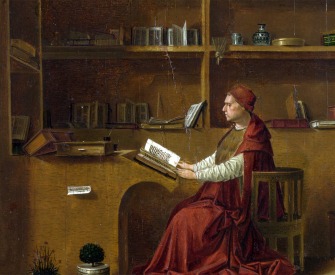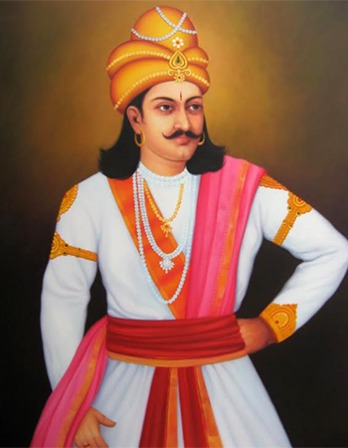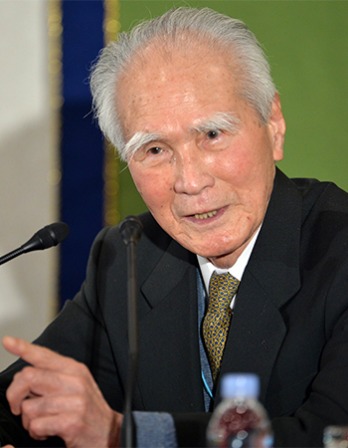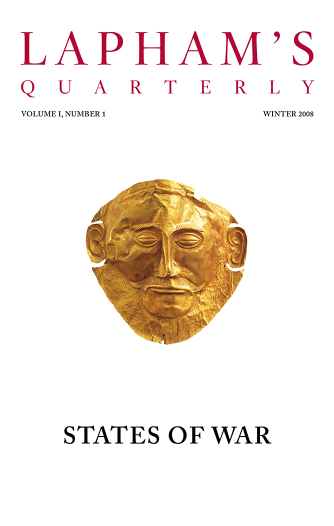Let him who desires peace prepare for war.
—Vegetius, 385Introducing the Candidates
Daniel Alarcón covers the election in cell block seven.
Each block of the Lurigancho prison is run by a boss, a ranking figure in the Lima underworld, whose authority within the block is unquestioned. Block Seven in El Jardín, which is reserved for international drug traffickers, is an exception.
Block Seven houses many men who, by virtue of their occupation, have traveled the globe, hold multiple passports, and speak several languages. The standard of living here reflects the relative wealth of this elite. The traffickers are businessmen, accepting as an article of faith that most problems can be resolved, if not avoided altogether, with money. The majority are Peruvians, many from the coca-producing jungle regions in the east, but there are others, too: men from China, Holland, Italy, Mexico, Nigeria, Spain, Turkey. The walls of the yard show the diversity of its residents: painted maps of the European Union, logos of Colombian soccer teams, murals celebrating jungle life, one of which shows a small biplane, the emblem of the drug trade, floating high above green, forested hills. There are nearly thirty nations represented, and inmates range from the unlucky would-be drug mule who never made it past airport security to the experienced cocaine trafficker patiently serving out his third or fourth prison sentence in as many countries. There are ordinary inmates as well, men brought in to the block to work. The result is a uniquely cosmopolitan culture—in Lurigancho, but not of it—a gated community within a prison. Because the nearly four hundred inmates there have little interest in or connection to the hierarchies of Lima’s dark streets, Block Seven is not run by a single boss. Here, there is democracy.
I arrived on a Sunday morning last March to find Block Seven in a particularly festive mood. The yearly campaign to elect a new governing body was underway. Pepe, the gregarious candidate at the top of List #2, was going door to door with his partner, Richard, the prosperous owner of the block’s chicken restaurant. (I am using pseudonyms to protect the privacy and security of all the inmates who shared their stories with me.) Their opponents were running a man named Barrios as delegado, but List #1 was really controlled by an Israeli trafficker named Avi. Each list had a half dozen positions: delegates for Food, Discipline, Economics, Culture, Sport, and Health, along with subdelegates in each of these areas. Many inmates were wearing campaign shirts—white with a blue star, or red with yellow letters reading pepe and richard, vote for change. There were campaign posters lining the walls, some drawn to look like the front pages of local newspapers, others citing fictitious block-wide polls. One featured a drawing of an old wooden tennis racket and the phrase ¡no más raquetas!, the slang term for police inspections. These are such rare occurrences, and the concept of contraband is so flexible in Lurigancho, that every raqueta is seen as an offense to the established order, and the hallmark of a bad delegado.
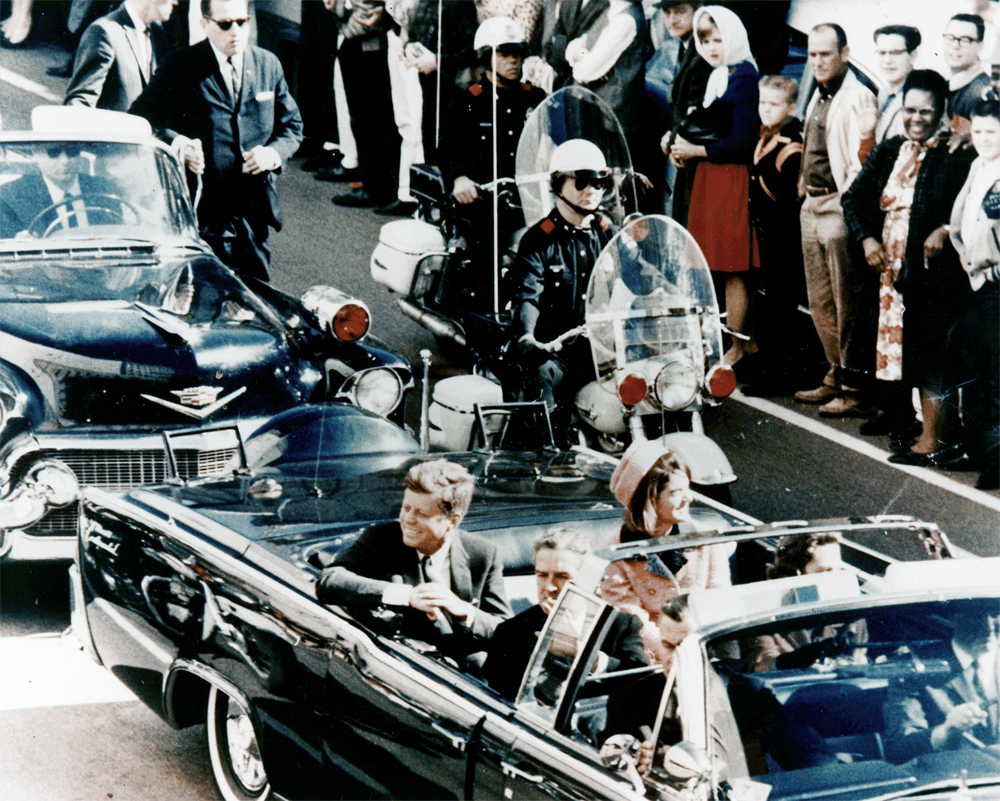
President John F. Kennedy minutes before his assassination, Main Street, Dallas, Texas, 1963. Photograph by Walt Cisco.
Pepe and Richard had thrown a party the day before I arrived, and multicolored flags emblazoned with the number two were still strung across the yard. A handful of shirtless men were breaking down the stage, where a band from a neighboring block had performed. Pepe and Richard had even arranged for dancers from the outside to join the show, voluptuous women who’d made quite an impression on the electorate. While the music played and the women danced, Pepe had gone table to table, shaking hands with his fellow inmates and their visiting families, asking for votes. This, after all, is how elections are won, whether in prison or out on the streets. The party had been, by all accounts, quite successful.
After the party, Avi had released a new batch of hand-drawn campaign posters:
think, compañero:
will you let them
buy your vote
with a party?
no to spending
yes to investment
vote 1
I met Murat, a Kurd known around the block as the Iraqi, a few days before the election. He was tall and thin, with a narrow face and black hair tied in a severe ponytail. A blurry star was tattooed midway up his left arm. When Murat arrived in Lurigancho, he knew no Spanish, but now—five years later—he spoke well enough to run as one of List #2’s economic delegates. He’d learned Spanish by necessity, of course. There were no other Kurds or Arabs with whom to speak.
“Two Kurds,” he said, “and we’d run the whole prison.”
Although for this election they were on opposing sides, Murat and Avi were friends, and Murat took me to see the brains and prime mover behind List #1. Avi welcomed us into his air-conditioned cell with a warning: there wasn’t much to say about the election. “I hate politics,” Avi said, arms open in a kind of shrug. His smile told me otherwise: he grinned with the exaggerated sincerity of an actor trying to make his expression visible to the audience in the cheap seats.
Avi wore a pair of brand-new Nikes, blue track pants, a white T-shirt, and a yarmulke crowning his short salt-and-pepper hair. On a wooden shelf above his bed sat a framed photo of his two grown children, a reminder of the life waiting for him back in Tel Aviv. He caught me looking and explained that although his daughter was engaged, she refused to marry until her father could be present at the ceremony. Avi frowned. He was eleven years and five months into a twenty-year sentence.
The Israeli offered the Iraqi a cigarette, and as the cell filled with smoke, the two men slipped into a good-natured back and forth about the future of the block. A short, chubby-faced Peruvian named Morales joined our impromptu political salon.
“Has a foreigner ever been delegado?” I asked.
The three of them recalled a Nigerian named Michael who rose to the position after a Peruvian delegado was transferred. “When?” I asked, and here they fell silent. Who could say for sure? In prison, the days, months, and years often seemed to blend together: 2003, 2004, 2005? And really, what did it matter now that the Nigerian had been released? They did remember one thing: he’d run for reelection and lost.
“A foreigner can’t control us,” Morales said, a hint of pride in his voice.
Avi insisted that his role in the election was minor: “I have no reason to be a part of this. The winner of these elections must be the people. We need water and electricity, and no trouble from the cops.”
To combat the budgetary shortfall, Avi’s opponents, Pepe and Richard, proposed to raise taxes. As it stood now, every resident of the block contributed three soles (about a dollar) each week for maintenance and security. Traditionally, anyone who has been in for more than seven years is exempt. List #2 would do away with exemptions and introduce a new system: one to seven years would pay three soles, seven to ten years two soles, and over ten years just one. For Avi, it amounted to cruelty, an unwillingness to understand the realities of the block. His campaign had filled Block Seven with posters that read, no to shock!
“I can afford it,” Avi said, “but there are people here who can’t. How are you going to charge them?” Nor did Avi trust his opponents’ motivation: “Why do they throw a party?” he asked. “To get people to spend money.” Campaigning was a necessity, but his list had a different tack: they were giving away a chicken dinner that evening to everyone in the block, gentleman or rufo, citizen or resident, a celebration to end the campaign. There’d even be chicken for me, if I wanted.
“Richard’s chicken?” I asked, half joking.
Avi smiled. Of course he wouldn’t buy chicken from his opponent. “From the outside,” he said.
Richard’s Chicken brought a singular innovation to Lurigancho’s restaurant scene: delivery. Before the economic crisis, Richard sold up to 120 roast chickens a week, working only on visiting days, taking orders from all over the prison complex. Those were the heady times, when Lurigancho was flush with money, full to bursting; when every visiting day was a carnival. They could hardly keep up with the business. Now Richard’s sold half as many chickens.
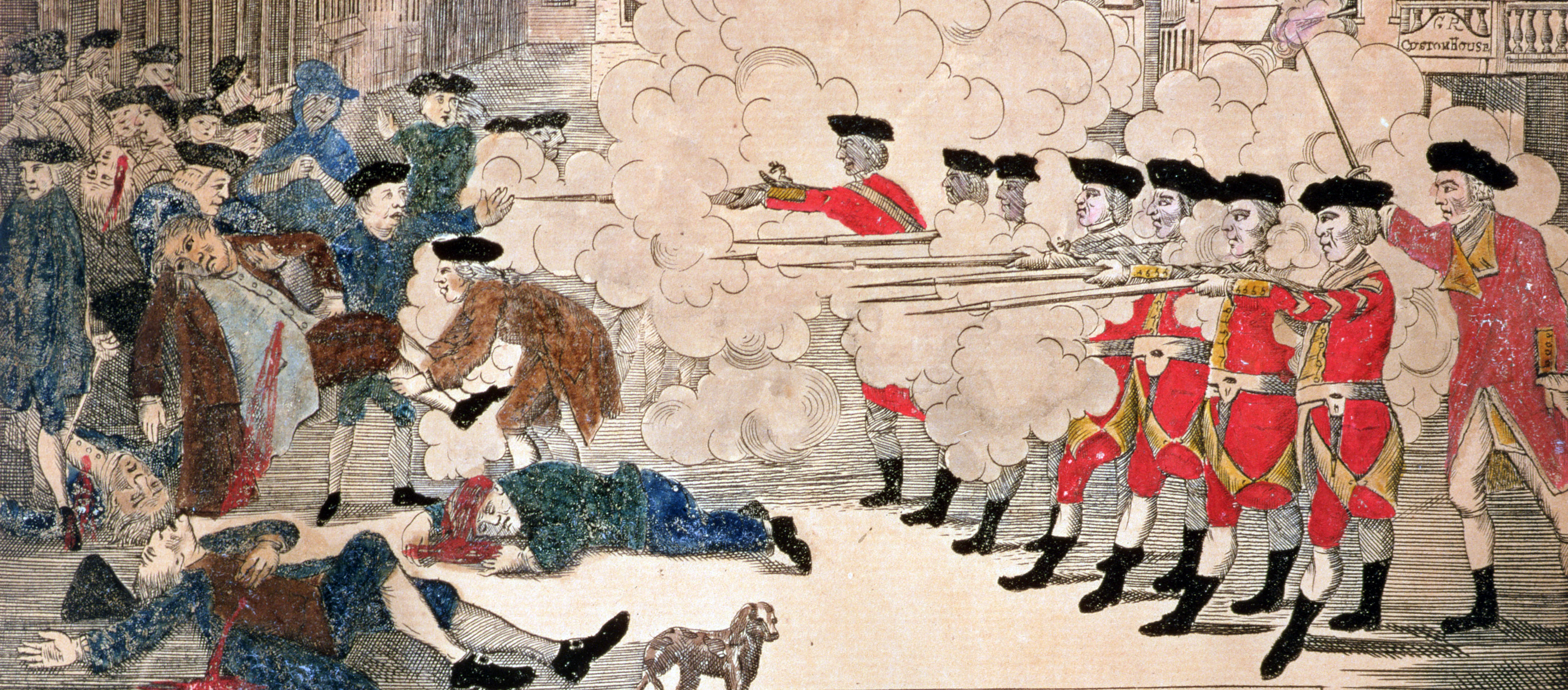
The Bloody Massacre, an engraving of the Boston Massacre, by Paul Revere, 1770.
Still, he was so identified with his restaurant that some of List #2’s campaign material spelled his name with a gratuitous ’s. Richard was at heart an entrepreneur. Previous delegates had lobbied for his support, but until 2010, when his co-conspirators had been released, making his own liberty suddenly seem possible, he’d always refused to participate in politics. “Now I want to leave something behind,” Richard told me. “I have this business, this chicken restaurant. I live well. My daughters go to a good school, but I want to leave my mark here.”
The same entrepreneurial spirit Richard brought to the campaign was what had landed him in Lurigancho to begin with. He came of age in Tocache, a rural town pivotal in Peru’s drug trade, at a time when the business was just getting underway. Coca grows easily in that region: three harvests a year, and according to the traffickers I spoke with, you scarcely have to tend to the plants. There was lots of money to be made for a smart young man like Richard. He didn’t think of himself as a criminal—everyone in Tocache was a part of the trade. “It was normal,” he told me. Richard harvested and processed his own crop, which he sold to Colombians; in addition, he owned a disco and three diners in town. On the day of Richard’s arrest, a well-known papaya seller had been robbed in Tocache. Police searched for the thief, inspecting every passing vehicle. It so happened that Richard’s truck was holding thirty-five kilos of cocaine.
Pepe had been arrested in Lima in November 2006, after working for years as a pilot, flying processed cocaine into Colombia. Tall, broad-shouldered, and charming, he was suited to the occupation. I found it easy to imagine Pepe flying placidly over the endless Amazon Basin. The main thing, he told me, was calculating your fuel: enough to get you there, but not a drop more. Every available inch of the plane must be filled with product. Now Pepe was four years into a twelve-year sentence. Like Richard, he shared his tale without pride, bitterness, or shame. Neither was the sort to indulge in the prisoner’s lament, that long nostalgic list of all that had been lost—women, cars, houses, money, freedom. Both were grounded in the here and now, in Block Seven, their home, and they were determined to win the election.
Pepe was at the top of the ticket, but in truth he and Richard were running as a duo. All over the block, posters carried both their names, and the slogan on their official platform read: if we succeed, it’s because we’re a team!!!!
Pepe defended his plan to do away with exemptions. Everyone was going to have to pay. Referring to the dilapidated state of the block, he said that the poorer residents, whom he called “refugees,” could live like this because they were used to it. “This is how they live outside,” he said. But not him: men in his position were accustomed to better.
As for their chances, Richard answered for the both of them: “I’m 100 percent confident we’re going to win.”

Daniel Alarcón
From “All Politics Is Local.” According to Alarcón, around seven thousand men live in Lurigancho, the ratio of prisoners to guards is one hundred to one, and, because of overcrowding, on any given night, between two and three hundred inmates have nowhere in particular to sleep. Born in Lima in 1977, Alarcón immigrated to the U.S. in 1980, grew up in Alabama, and graduated from Columbia University in 1999 and the Iowa Writers’ Workshop in 2003. He published a story collection, War by Candlelight, in 2005 and a novel, Lost City Radio, in 2007.
